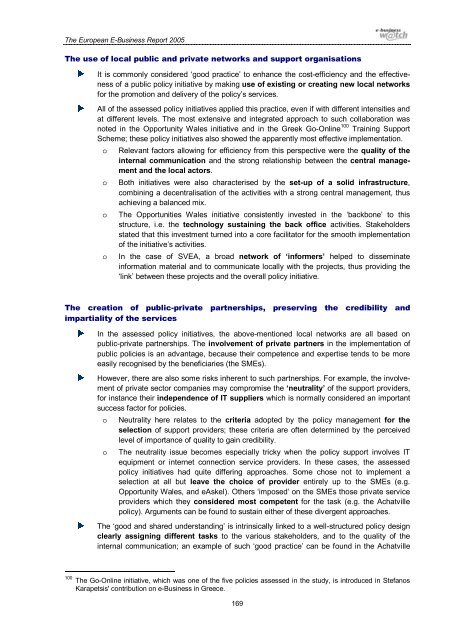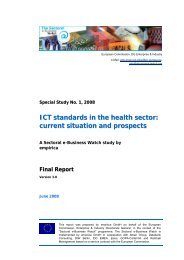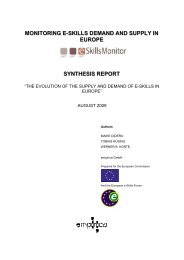The European e-Business Report The European e ... - empirica
The European e-Business Report The European e ... - empirica
The European e-Business Report The European e ... - empirica
You also want an ePaper? Increase the reach of your titles
YUMPU automatically turns print PDFs into web optimized ePapers that Google loves.
<strong>The</strong> <strong>European</strong> E-<strong>Business</strong> <strong>Report</strong> 2005<br />
<strong>The</strong> use of local public and private networks and support organisations<br />
It is commonly considered ‘good practice’ to enhance the cost-efficiency and the effectiveness<br />
of a public policy initiative by making use of existing or creating new local networks<br />
for the promotion and delivery of the policy’s services.<br />
All of the assessed policy initiatives applied this practice, even if with different intensities and<br />
at different levels. <strong>The</strong> most extensive and integrated approach to such collaboration was<br />
noted in the Opportunity Wales initiative and in the Greek Go-Online 100 Training Support<br />
Scheme; these policy initiatives also showed the apparently most effective implementation.<br />
o<br />
o<br />
o<br />
o<br />
Relevant factors allowing for efficiency from this perspective were the quality of the<br />
internal communication and the strong relationship between the central management<br />
and the local actors.<br />
Both initiatives were also characterised by the set-up of a solid infrastructure,<br />
combining a decentralisation of the activities with a strong central management, thus<br />
achieving a balanced mix.<br />
<strong>The</strong> Opportunities Wales initiative consistently invested in the ‘backbone’ to this<br />
structure, i.e. the technology sustaining the back office activities. Stakeholders<br />
stated that this investment turned into a core facilitator for the smooth implementation<br />
of the initiative’s activities.<br />
In the case of SVEA, a broad network of ‘informers’ helped to disseminate<br />
information material and to communicate locally with the projects, thus providing the<br />
‘link’ between these projects and the overall policy initiative.<br />
<strong>The</strong> creation of public-private partnerships, preserving the credibility and<br />
impartiality of the services<br />
In the assessed policy initiatives, the above-mentioned local networks are all based on<br />
public-private partnerships. <strong>The</strong> involvement of private partners in the implementation of<br />
public policies is an advantage, because their competence and expertise tends to be more<br />
easily recognised by the beneficiaries (the SMEs).<br />
However, there are also some risks inherent to such partnerships. For example, the involvement<br />
of private sector companies may compromise the ‘neutrality’ of the support providers,<br />
for instance their independence of IT suppliers which is normally considered an important<br />
success factor for policies.<br />
o<br />
o<br />
Neutrality here relates to the criteria adopted by the policy management for the<br />
selection of support providers; these criteria are often determined by the perceived<br />
level of importance of quality to gain credibility.<br />
<strong>The</strong> neutrality issue becomes especially tricky when the policy support involves IT<br />
equipment or internet connection service providers. In these cases, the assessed<br />
policy initiatives had quite differing approaches. Some chose not to implement a<br />
selection at all but leave the choice of provider entirely up to the SMEs (e.g.<br />
Opportunity Wales, and eAskel). Others ‘imposed’ on the SMEs those private service<br />
providers which they considered most competent for the task (e.g. the Achatville<br />
policy). Arguments can be found to sustain either of these divergent approaches.<br />
<strong>The</strong> ‘good and shared understanding’ is intrinsically linked to a well-structured policy design<br />
clearly assigning different tasks to the various stakeholders, and to the quality of the<br />
internal communication; an example of such ‘good practice’ can be found in the Achatville<br />
100 <strong>The</strong> Go-Online initiative, which was one of the five policies assessed in the study, is introduced in Stefanos<br />
Karapetsis' contribution on e-<strong>Business</strong> in Greece.<br />
169

















